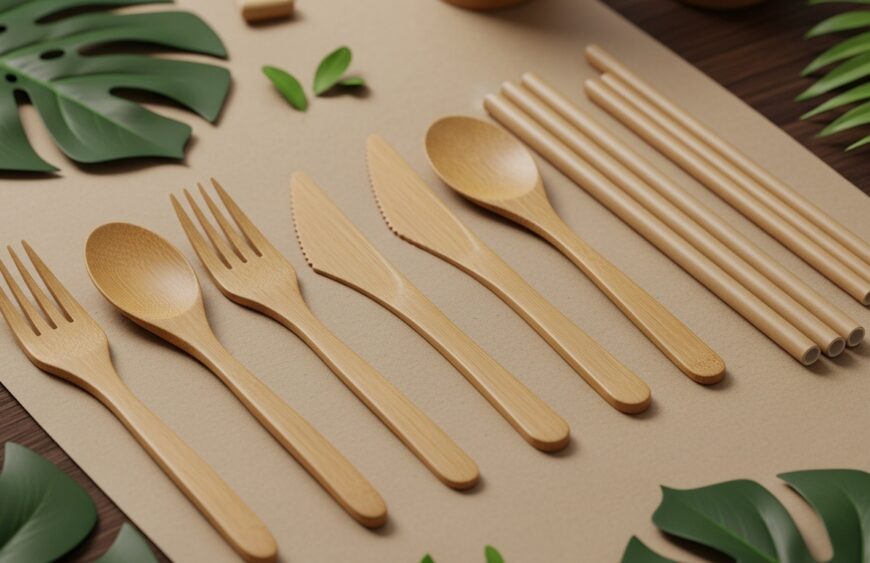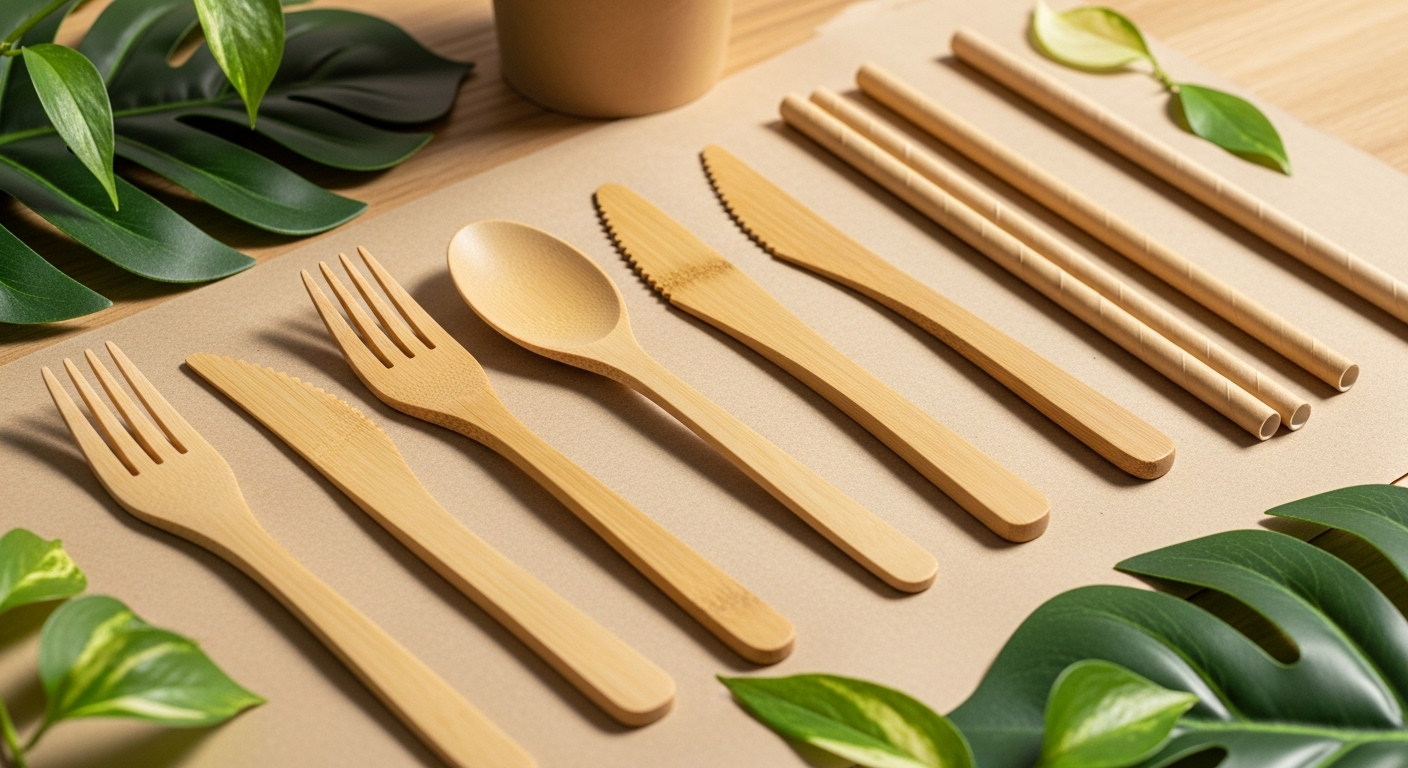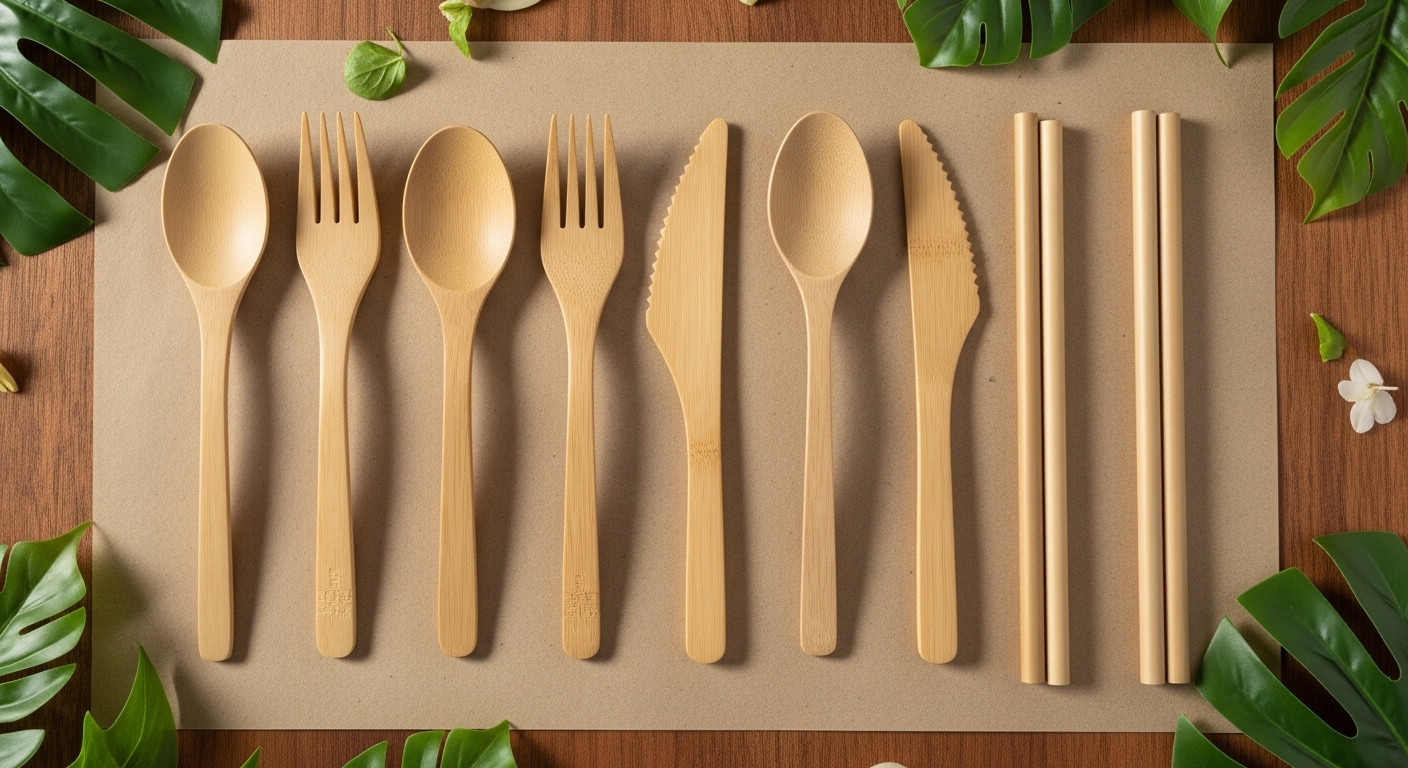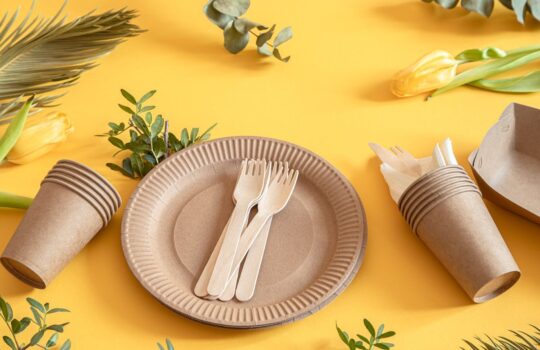Sustainability is now a business standard. As the global fight against plastic waste intensifies, companies, including those in the food industry, are rethinking how they operate. Coffee shops, restaurants, cafes, and catering companies are all turning to eco-friendly cutlery and straws as simple yet powerful steps toward sustainability.
This shift helps protect the planet, improve your bottom line, enhance your reputation, and help you comply with evolving regulations in the food industry.
Let’s break down how switching to sustainable alternatives can benefit your business and why it’s a decision that pays off in more ways than one.
What Are Eco-Friendly Cutlery and Straws?
Eco-friendly cutlery and straws are made from biodegradable, compostable, or recyclable materials that minimize harm to the environment. Unlike plastic utensils, which can take hundreds of years to decompose, sustainable alternatives break down naturally without leaving behind toxic microplastics.
Common materials include bamboo, cornstarch (PLA), paper, wheat, sugarcane (bagasse), and wood. Many of these products are certified compostable under international standards such as ASTM D6400 or EN 13432, meaning they safely return to the earth when disposed of properly.
Beyond their materials, these products represent a broader movement toward a circular economy that values reuse, responsible sourcing, and minimal waste.
Why Businesses Are Making the Switch
The pressure to ditch plastic is now enforced by law to protect the environment and human health.
In Canada and many other countries, single-use plastic bans are already in effect. Businesses that continue to use traditional plastic straws, stirrers, and cutlery risk fines and reputational damage.
Customers, too, are increasingly favoring eco-conscious brands. In fact, a study revealed that 78% of global consumers prefer to purchase from sustainable companies.
Switching to eco-friendly options also signals innovation, as it shows that your business is forward-thinking and aligned with global sustainability goals. For food service brands, this alignment can directly impact sales, brand loyalty, and partnerships.
The Key Benefits for Your Business
Here are some key advantages of using eco-friendly cutlery and straws for your business.
Enhanced Brand Image
Your packaging and tableware say a lot about your values. When customers see compostable cutlery or paper straws, they immediately associate your brand with environmental responsibility. It creates a positive emotional connection and positions your business as one that cares about people and the planet.
This reputation translates into stronger customer trust, higher brand recall, and improved online reviews.
Increased Customer Loyalty
Eco-conscious consumers are among the most loyal. They prefer to support businesses that reflect their values, and they’re more likely to return when they see consistency in your sustainability practices. Offering compostable straws or bamboo cutlery tells your customers that your brand is part of the solution, not the problem.
For cafés, restaurants, and event organizers, these small gestures create lasting impressions that drive repeat business and word-of-mouth marketing.
Compliance with Regulations
Across Canada, the U.S., and Europe, plastic bans are tightening every year. Businesses that transition early to sustainable alternatives not only avoid penalties but also simplify future compliance efforts.
By adopting biodegradable cutlery and straws, you eliminate the risk of being caught off guard by upcoming restrictions. You also position your company as a leader in environmental responsibility.
Cost Efficiency in the Long Run
One of the biggest misconceptions is that sustainable products are always more expensive. While the initial cost may be slightly higher than plastic, long-term savings are often greater. Bulk purchasing reduces unit costs, and many suppliers now offer competitive pricing for eco-friendly options.
Moreover, biodegradable waste can lower your waste management fees and help your business qualify for green certifications or tax benefits in certain regions. The investment pays for itself through improved brand equity, customer retention, and operational efficiency.
Strengthened Corporate Social Responsibility (CSR)
Adopting eco-friendly cutlery and straws supports your broader CSR strategy. It shows that your business is actively reducing its environmental footprint. This commitment not only resonates with customers but also with investors, employees, and corporate partners.
CSR has evolved from being a “nice-to-have” to a business imperative. Companies that integrate sustainability into their core operations are seeing stronger growth, better retention rates, and more resilient supply chains.
The Environmental Impact
Plastic utensils are among the top pollutants found in oceans and landfills. By switching to eco-friendly alternatives, your business directly helps reduce this burden. Compostable products break down naturally within months instead of centuries, leaving no toxic residue behind.
Materials like bamboo and sugarcane also require less energy and water to produce, which means a smaller carbon footprint. When used at scale, these sustainable products make a measurable difference in reducing waste and greenhouse gas emissions.
Moreover, customers notice when you make these changes. Displaying “Compostable Cutlery” or “Plastic-Free Straws” signs at your store or event reminds people that sustainability is part of your brand DNA.
Practical Steps to Transition
If your business is ready to make the switch, start small. First, replace one category, such as straws, and monitor customer feedback. Gradually move on to cutlery, plates, and packaging.
Choose a trusted, eco-friendly packaging supplier who offers certified products and consistent quality. Train your team to communicate the change clearly, inform customers that your new items are compostable, and explain how to dispose of them properly.
Simple additions, like table signage or menu notes (“We use 100% biodegradable cutlery”), can enhance customer appreciation. They also reinforce your commitment to sustainability.
Common Myths About Eco-Friendly Cutlery
Many businesses hesitate to switch due to outdated assumptions:
- It’s too expensive: Prices have dropped significantly as demand has grown. Today, sustainable options are often within 10–15% of the cost of traditional plastics.
- They’re not durable: Modern eco-products are designed to perform well — bamboo, cornstarch, and sugarcane options are sturdy enough for hot foods and liquids.
- Customers don’t care: They do. Sustainability is now a deciding factor for where people eat and shop. Ignoring it means losing relevance in a rapidly changing market.
Conclusion
Switching to eco-friendly cutlery and straws is both a sustainability move and a smart business strategy. It enhances your brand’s credibility, aligns you with future regulations, and earns the loyalty of conscious consumers.
Small steps like replacing plastic utensils can lead to significant long-term rewards for both your business and the environment.
If you’re ready to start, partner with reliable suppliers like Planetize Packaging, where sustainability meets practicality.
FAQs
- What materials are best for eco-friendly cutlery and straws?
Bamboo, cornstarch (PLA), paper, sugarcane (bagasse), and wheat are among the top eco-friendly materials due to their compostability and renewable sourcing. - Are compostable straws better than biodegradable ones?
Compostable straws break down faster and more completely in industrial composting facilities, leaving no trace of microplastics. - Can switching to eco-friendly products save money?
Over time, yes. While initial costs may be slightly higher, savings come from lower waste disposal fees, improved customer loyalty, and potential green certifications. - How do I promote my business’s eco-friendly transition?
Highlight it on menus, social media, and packaging. Use phrases like “We’re going plastic-free” to educate and engage customers. - Where can I buy eco-friendly cutlery and straws in Canada?
Planetize Packaging offers certified compostable cutlery and straws for Canadian businesses, ensuring quality, compliance, and sustainability at scale.








